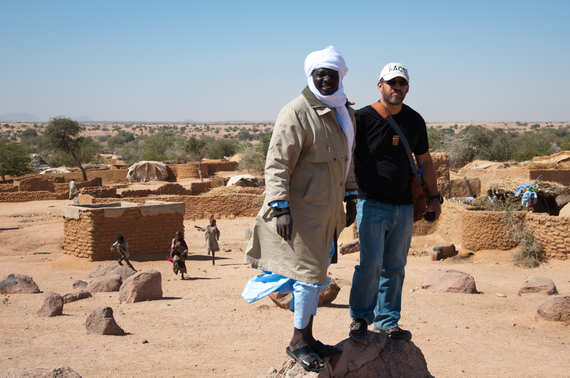rad·i·cal adjective \ˈra-di-kəl\
: very new and different from what is traditional or ordinary
: very basic and important
: having extreme political or social views that are not shared by most people
Living right by the beach in Southern California, I hear the word "radical" quite often. Sometime, since it's such a long word, it gets cut down to the even cooler three letters, "rad." Waves are described as radical, and I'm not a surfer, but I agree. A skateboarding move, new board shorts, and even the weather can be rad!
I feel fortunate to live surrounded by radical. Then I go on trips to eastern Chad, and radical takes on a whole new meaning. The experiences can be extreme and radical, like having bullets flying around during a military coup or driving around roadless, remote areas, where only camels live. But, when we make it to the refugee camps and stand side by side with our Darfuri friends, working on programs that, in the most basic of ways, look to end cycles of violence and exclusion, there is only one way to describe the change we are looking for: RADICAL.
Radical change is knowing that empathy is the way to a more hopeful and peaceful world -- and that every child contains all the empathy necessary to fuel a peaceful lifetime, if it is maintained and nurtured.
I'm about to embark on my 20th trip to Darfuri refugee camps on the Chad-Sudan border. The last nine years have been full of challenges, disappointments, sadness, but surprisingly, also joy. We found that Darfuris have experienced horrors we would never want to even imagine. That, after 11 years of violence, they are not closer to peace or going back home. That the world moves on and forgets. But we also found that the refugees are full of life and will do whatever is needed for their children to have a better life. The solution to their difficult situation is within them. They just need the opportunity. Instead of the world saving the children of Darfur, the children of Darfur will save themselves and the future of their people. That is so radical.
From trip #1, the survivors that had just escaped Darfur told us that education was the most important to them. That they wanted their children to learn and play and thrive -- while all they had was a tent and handouts. I remember, as they told me this, thinking, "Yes, yes, but how do we stop genocide? How do we change the way the world responds to these mass atrocities?" And I would look outside of Darfur for the answers. Activism, political pressure, international military action -- what would make the difference?
I would keep going back, and the mothers would tell us, "Support our children's education," and the kids and youth would tell us, "Bring us some soccer balls, and play with us!" Teachers talked about wanting to connect with the world, about the essential sense of brotherhood and sisterhood they needed to give them energy and hope. Our small team listened, and we learned, and we eventually came to the realization that this was the radical way forward. Hope, peace, and change can and will come through providing people with the opportunity to give their children safe, nurturing spaces and ways to thrive and connect.
Projects that focus on early childhood development, comprehensive sports programs, and people to people connections are not the traditional way to have an impact on genocide and mass atrocities, but they are key pieces to this difficult puzzle. They are also joyful and, I would say, extremely RADICAL!
Check out our ways to bring:
Let me know what you think.
Peace,
Gabriel

